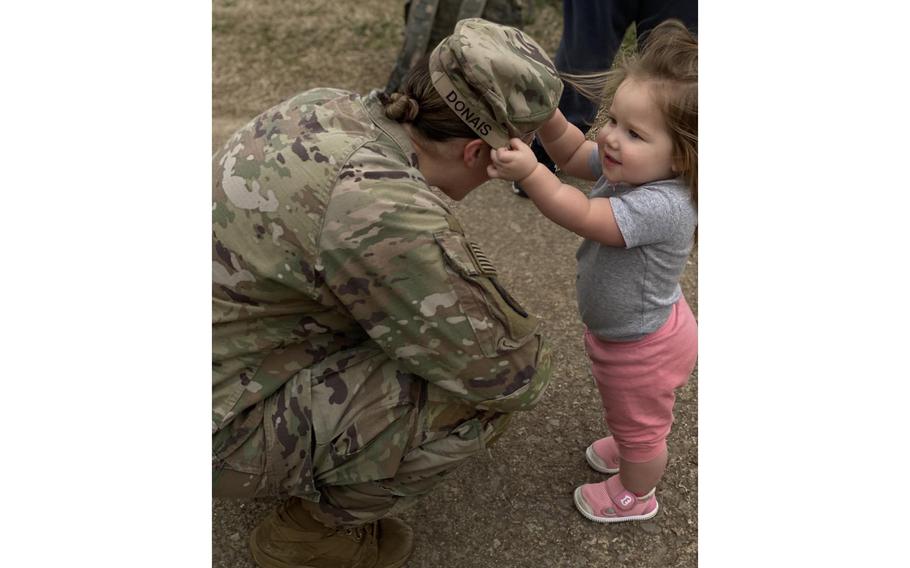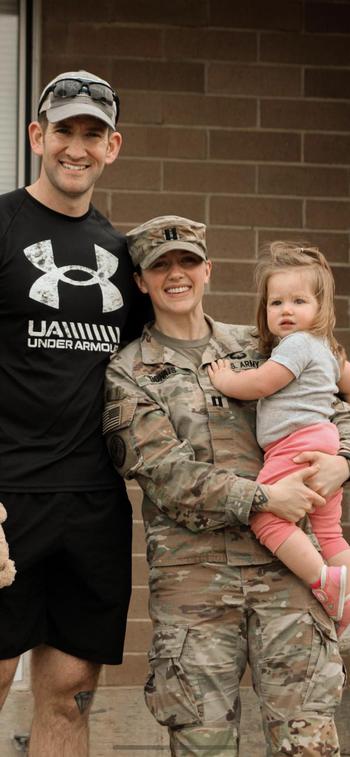
Jordan Donais, 1, reaches for the hat of her mother, Capt. Pam Donais, during a deployment ceremony at Fort Campbell, Ky. Donais and her husband Staff Sgt. Dan Donais are deployed to Europe with 1st Brigade Combat Team, 101st Airborne Division. (Photo provided by Pam Donais)
When Army Capt. Pam Donais learned the unit that she commands at Fort Campbell, Ky., would be part of an upcoming deployment to Europe, she faced an added layer of uncertainty — her husband Staff Sgt. Dan Donais also received orders to deploy to the Continent.
Who would care for their 1-year-old daughter Jordan?
“They offered my husband to stay back,” Pam, 31, said during a recent interview from Hungary where her unit is now. She and her husband are assigned to the 1st Brigade Combat Team of the 101st Airborne Division.
After a family discussion, the couple decided they would both go forward on the nine-month deployment. They found a nanny through another soldier and left for Europe about two months ago. Dan, 33, is in Poland now.
During the Easter weekend, Pam said she was able to meet up with her husband and they placed a video call together to their daughter Jordan.
“I have the funniest pictures of her just lighting up realizing it's both of us. That was the longest conversation we’ve had with her,” Pam said.
Pam and Dan are what the Defense Department refers to as a dual-military couple, meaning both spouses are service members. More than 9,400 active-duty soldiers, or about 2% of the service, are dual military with children, according to the department’s most recent demographics data from 2020.

Army Capt. Pam Donais, a troop commander in 1st Brigade Combat Team, 101st Airborne Division, with her husband Staff Sgt. Dan Donais and their daughter Jordan, 1, before Pam’s deployment to Europe from Fort Campbell, Ky. (Photo provided by Pam Donais)
The Army Human Resources Command has a program for dual-military couples to help get them assigned to the same location or locations that allow the couple to share a home within 50 miles of each of their duty stations.
Commanders are also required to counsel all soldiers with children to develop a family care plan. The plan is required for the soldier to be considered deployable. Married soldiers cannot include each other in their care plans in case of circumstances where they are both called away from home, according to Army policy.
In the months overseas, Pam said the shared challenge of separation from family and friends has helped her unit bond together. Seven of her soldiers are expecting babies during the deployments. Two of them will be first-time fathers, she said.
“Soldiers, in general, they put on a tough front, but I understand it must be so hard you're missing all those first ultrasounds. The acid reflux and the morning sickness was terrible, but you want to be there. It's fun to experience it together,” Pam said.
It’s important for soldiers to talk about being separated from their families to better cope with those challenges, she said.
The couple chose to find a nanny for their daughter instead of having her stay with family because they wanted to change as little as possible about the rest of Jordan’s daily life in their absence. Jordan still lives in her home at Fort Campbell with the family dogs and attends the same on-post day care.
The Donais family also received support from Operation Gratitude.
Jordan received two teddy bears in camo outfits from the nonprofit, which distributes the “Battalion Buddies,” to comfort kids while their parents are away. Jordan was hesitant about the bears at first, Pam said, but now sleeps with them at night.
Established in 2003, Operation Gratitude works with volunteers to provide care packages and comfort items to service members and their families. They began issuing Battalion Buddies in 2011 and have provided more than 183,000 nationwide, said Carolyn Blashek, founder and interim CEO of the nonprofit.
There are about 1.6 million children of military members, and Blashek said deployments can be difficult for the youngest of those kids to understand.
“Utilized as a pre-deployment tool for service members to gift their children, Operation Gratitude Battalion Buddies are an item of comfort to our military children. These cuddly bears can be snuggled to assist with the challenging emotions that arise when coping with having a deployed mom or dad,” she said.
Even as the wars in Iraq and Afghanistan have ended, deployments have not slowed for the Army. About 120,000 soldiers are now overseas, said Jason Waggoner, spokesman for the Army.
Army Secretary Christine Wormuth said last week that the Army remains busy with missions but there remains a focus on creating predictability in soldiers’ schedules for training and overseas deployments.
“We have to keep our eye on the ball there because it is much harder, I think, for soldiers to manage for themselves and their families when they don't have any predictability. That in and of itself creates stress,” she said.
The Army has modified its policies involving parental leave in the last year, offering all new parents 12 weeks off after having or adopting a child. It also instituted policies making the service friendlier for breastfeeding mothers and dual-military couples with infants by allowing one parent to defer training so one of them is always home with their baby in the first year of the child’s life.
Pam said she and her husband never anticipated they’d be deployed at the same time, but Fort Campbell was also the first time that the couple served within the same brigade. In the past, they had always been at the same post but in different units with different schedules.
Pam and Dan Donais were already dating when they decided to enlist together almost nine years ago — she as a cavalry scout and her future husband in the infantry.
They met at Norwich University, a military college in Vermont. After graduation, they decided they missed the military aspect of their alma mater and enlisted in the Army.
They shipped out to basic training just a few weeks apart from each other, and Pam went directly to Officer Candidate School.
“We were going to have a family, and we were waiting for the right time in the Army. Then we learned the Army doesn't wait for you. You have to make plans and make the Army work around it,” she said.